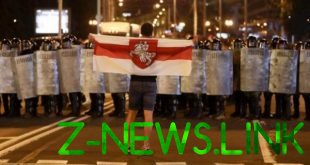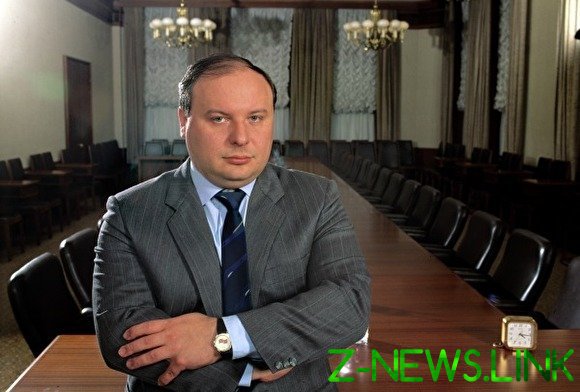
As Yegor Gaidar saved Russia from famine, and in reward received the resignation and curses
16 Dec 2009, 10 years ago, of a heart attack at the age of 53 years died Yegor Gaidar is the author and organizer of the transient market reforms of the early 1990s In the government of the Russian Federation, Gaidar spent only slightly more than a year as Deputy and first Deputy Chairman, Minister of economy and Finance finally, acting Chairman. But this year — from November 1991 to December 1992 — for the whole country proved to be the Rubicon.
Like every reformer, Yegor Gaidar, has a lot of fans and haters. The latter put him in the guilt of hyperinflation and the depreciation of deposits of the population, mass poverty, the collapse of the public sector and production, unjust and criminal voucher privatization (Gaidar himself claimed that it was categorically opposed and advocated the cash privatization through bidding, but the Supreme Council adopted the law on personal privatization deposits, providing for the introduction of vouchers, and “to go, it was nowhere”).
We give the floor to colleagues of the Gaidar Cabinet reform who shared their memories in the book of Aven and Alfred Koch “Revolution Gaidar. The history of the reforms of the 90s first hand”.
Gaidar’s reforms: “there was a real threat of starvation”
“Why Gaidar was the leader of all of this [reform] movement? — asks Peter Aven, Minister of foreign economic relations in the government of Yeltsin-Gaidar. Because Gaidar was sharpening under it. They all had different interests: science, personal life, anything else. But only Gaidar from his youth, thinking only about how to reform the country. Gaidar was already living the change, he himself to them prepared”.
On the top of the government of Yegor Gaidar, the Cabinet scholar, head of the economic policy Institute of the Academy of national economy of the USSR, gave a close aide of Boris Yeltsin, Secretary of state Gennady Burbulis. Gennady E. recalls: “That was good: in Gaidar’s papers the idea immediately accompanied by the steps tool. The law — decree, the decree — law, decree. And it was clear what was being proposed and how to do it. Pass times — Boris: “I can’t. How so? That’s the only way and not otherwise?“ — “Just so”. — “And there’s another possibility?” “No.” And every day while we’re wasting time discussing, these other possibilities are irretrievably melt, melt… But the ending like this: Yeltsin says: if nothing else, means, we will do so. Point… Actions are reduced to what not to do. That is, to do or not to do — we already had this set… This, by the way, didn’t understand [co-author of market reform program “500 days” Grigory] Yavlinsky, because he’s always got this position: I will only do what they want, and what we need, but I’m not going to do that. And in this case, the ultimate situation was clearly the team Gaidar written, and it coincided with the rational thinking of Yeltsin. Accurate, clear and dynamic, the challenge and solution”.
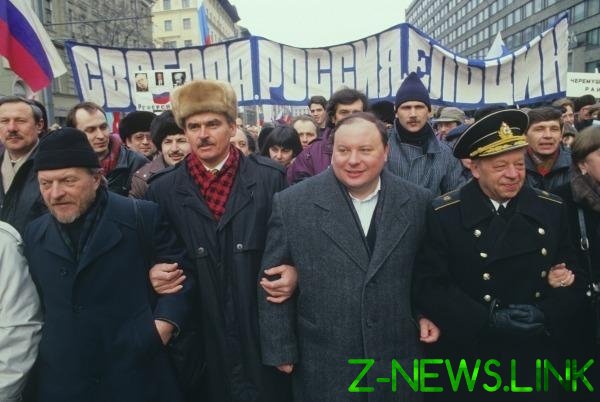 Egor Gaidar in 1990-m to year. To the right of his father Timur Ghidurilor Mikhalev / RIA Novosti
Egor Gaidar in 1990-m to year. To the right of his father Timur Ghidurilor Mikhalev / RIA Novosti
The most acute problem faced by the Gaidar team — an unprecedented trade deficit. “It was impossible to buy anything… My wife spent four hours to buy food, omega all the shops”, says Peter Aven. Now, when modern commodity abundance is not hard to believe, but the country is bankrupt, without exaggeration, was on the verge of starvation.
“This is a real situation that Gorbachev could not know: the Forex reserves was $ 25 million and external debt of 6 billion. Most of the debt is short — term… we Have commercial production of meat (it was mostly poultry and pig farms, large complexes) sitting on imported grain. Completely. And the import stopped. One day in late November or early December 1991, all Vice-mayors from Peter come to government and say: “we Have grain reserves remained for three days. Three days later, begin to die chickens then people.“ All sat on the American supply of grain, and credits are frozen. I instead Gaidar then held a meeting. And then I wrapped the ships [with the grain] on their way to Murmansk, opened the state to save Peter, realizing that besieged the city a second time hunger better not to worry. Starvation would not exist, but hunger at the household level in the form of lower consumption would be,” — says the economy Minister in the early 90s, Andrei Nechayev.
Theme is developed by Stanislav Anisimov, then — Minister of trade and material resources: “Ukraine has ceased to supply [of food]. Belarus has ceased to supply. All stopped… Other regions do not really want to change food, for example, in some large machines. Or tanks… suffer From it first of all the large industrial enterprises and cities… [the Mayor of St. Petersburg] Sobchak says: “I don’t know what to do! The city did not. I can’t sell the public, and where to get don’t know!””
Gaidar could do nothing except drastic measures, which for years was postponed by the governments of the USSR and RSFSR.
In January 1992 came a decree on the liberalization of retail prices, in other words — the freedom of trade. “As soon as the decree on free trade was signed, tomorrow is already on all the roads on carriageways has been products — describes Anisimov. — Freedom of trade, the liberation of prices was conducted in parallel with the liberalization of foreign trade, and the absolute value of import began to grow. And this also helped to prevent famine. These two things: the availability of prices and liberalization of foreign trade.” “I think that the appearance of the goods after the total deficit was such a pleasant shock that it largely offset the shock from the fact that in the first stage, two times jumped,” adds Andrei Nechayev.
Note that speeding inflation amounted at the end of 1992, not 100% but more than 2500%. Stereotypes indicate memory of Gaidar as a ruthless liquidator of the savings of Russians. But the historical evidence suggests that he rather had to clean up the “legacy” of the Soviet predecessors. “It’s Pavlov reform (monetary reform Minister of Finance of the USSR, later the last Soviet Prime Minister Valentin Pavlov, conducted in January 1991 — approx. ed.) has destroyed deposits of citizens, and not Gaidar! — outraged Alfred Koch, in the years 1993-97: Deputy, first Deputy, Chairman of the state property Committee, Deputy Chairman of the Russian government. — I remember that from the deposits in the savings Bank was allowed to withdraw not more than 500 rubles per month. And by the time when Gaidar with his team came to the government, these contributions have not been in the savings Bank of the USSR. All deposits have been withdrawn from him by the Federal government and used to Finance the deficit of the Federal budget. Thus, Gaidar could not destroy the deposits (or, as some say, steal). In the absence of the object destruction”.
“Savings was not, was recording in the accounts, which were nothing. Gaydar only recognized this fact… Therefore, from the point of view of inflation it’s all bullshit. Zero rubles, not subject to inflation, confirms Peter Aven. I thought I really could discuss that the whole subject of social support was on the sidelines. First of all I’m talking about pensioners. Some special forms of support for pensioners in 1992 you could think of. Even symbolic. May be disproportionately more vouchers to give the elderly, land for vegetable gardens under the garden plots for individual construction”.
Probably so. But in General, concur professional economists, marketeers in the first few months at the turn of 1991 and 1992, Gaidar was not reformism, and neither more nor less than the salvation of the country and citizens the only possible at that time ways. “Freedom of choice for him was exactly zero. He did exactly what would any responsible government in its place,” — said Alfred Koch.
Moreover, according to Stanislav Anisimov, “if Gaidar was [Prime Minister] in 1993, and, God forbid, in 1994, we would have already been not in the society. We would be much better and faster came all this way for reform. He knew what to do, knew all of the progressive movement.”
Gaidar and Yeltsin: “it Turned out that we and Yeltsin — two completely different worlds”
Supporters of Gaidar argued that if market reforms started a couple of years earlier, as in Poland, Czechoslovakia, Hungary, Yes, if more substantial financial aid from the West, at least in the amount of 10-20 billion dollars, the liberalization of the economy and the political sphere would be irreversible. But it had happened. Power in the person of President Yeltsin and Gaidar’s reformist government is rapidly losing popularity.
In the spring of 1992, the delegates of the VI Congress of people’s deputies knocked on the heads of Ministers tubs accusations and insults. There it was. Lightning was followed by a collective statement of resignation do not like it — do it yourself! The demarche of the government cooled the indignation of the deputies. However, needed to weaken the monetary policy and the resignation of “the godfather” reformers Gennady Burbulis, and the Minister of fuel and energy Vladimir Lopukhin.
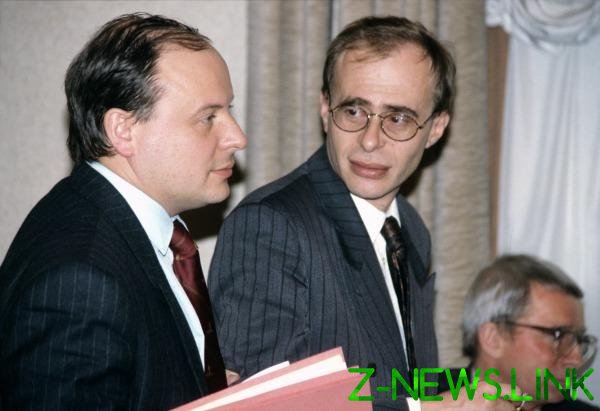 Yegor Gaidar and Vladimir Louhenapessy Fighters / RIA Novosti
Yegor Gaidar and Vladimir Louhenapessy Fighters / RIA Novosti
“Lopukhin had to do a report. Entered Yeltsin, late for three or four minutes (what happened very rarely), dad opens up and says (no Hello): “Sign a decree on the withdrawal of the Minister.” Everyone froze, “What Minister?” He says, “Lopukhin. And to appoint to the post of Deputy Prime Minister for fuel and Energy, Chernomyrdin, Viktor Stepanovich“, — shares his memories of Peter Aven. — Gaidar became red like a tomato, and Lopukhin, white as the wall. Everyone froze, it was a feeling that he will continue to tear the government to pieces. Lopukhin had to do a report. Yeltsin something told him quietly, and then says Gaidar: “Gaidar, report”. And Egor, without saying a word, took Lopukhin prepared the report, came to the podium and read it. Lopukhin was sitting completely dazed, I thought he was going to die.”
“It was a powerful pressure takavci, which infuriated: what kind of Minister we put?.. Tech lobby was the most powerful, they wanted their rights”, — says Alexander Shokhin, then Deputy Prime Minister for social policy.
But the gaze of the great victory: “We were called when I was a complete ass and nobody knew how it would all turn out. When we survived the winter, that’s the most tragic, from 1991 to 1992, and comrades, it became clear that the people all ate, they said: “we Need to take back”… and these idiots still can be blamed. It’s time to return to the place”. “The team zasidelis more than imagined that she can claim more and piece of political power. This illusion Yeltsin quickly dispelled… So that’s hired a team, which may be terminated [at any time]… And which, incidentally, is not paid, so, if you understand. Then throw out all without severance pay in fact,” adds Vladimir Mashits, former Chairman of the State Committee on economic cooperation with States-members of the CIS.
Subordinate Gaidar Lopukhin was shot “through the head” Yegor without consulting him and without even putting up a in advance in popularity. But the incident Gaydar “swallowed”: it was necessary to retain power to complete the transformation programme. And in December 1992, the following, VII the Congress of deputies, came his own turn. Claims to “upstart” Gaidar has accumulated so much that the deputies refused to approve him as Prime Minister. Yeltsin had to give way and nominate trapped a compromise figure of Viktor Chernomyrdin.
“I believed that we are one team, we Yeltsin. It turned out that we and Yeltsin — two completely different worlds… Now I understand what took Yeltsin’s totally inadequate, considering that he’s such a Patriarch, which for us will fight until their resignation. We were absolutely not prepared for what we so callously waste that will be removed and you then that is the question don’t raise,” insists Peter Aven.
Gaidar still I will briefly return to the government in September 1993, acting Minister of economy, first Deputy Chernomyrdin. During this period he is remembered as one of the most active and brave members of the military confrontation on 3-4 October 1993. Gennady Burbulis: “When Egor came with [television] a call to arm our supporters and put them on the street, I thought this can not be done. This cannot be done for the reason that we are responsible first and foremost for the people. But people got up and left, and Gaidar was absolutely right.” “Khasbulatov was stunned! He did not expect such a hard an adequate response. He thought that victory is in their hands. But won Gaidar. Then it was firing from tanks at the White house, but first was armed with Gaydar people at the city Council,” recalls Alfred Koch.
According to Koch, “the return of Gaidar in the government in the autumn of 1993 guaranteed Yeltsin, Gaidar will not go alone to the polls [the State Duma] in December 1993. And then, after the election, when the danger had passed, he quietly in January bureaucratically managed government.”
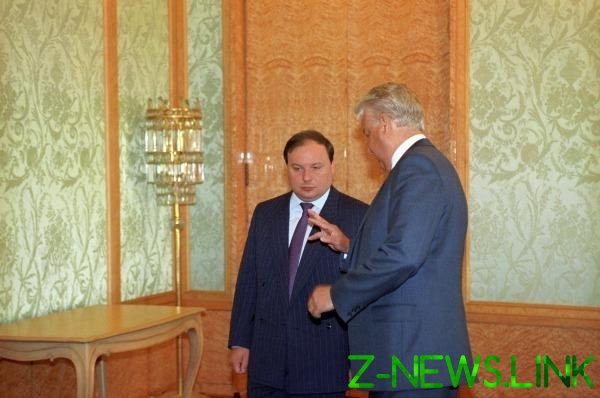 Yegor Gaidar and Boris Altindere Donskoy / RIA Novosti
Yegor Gaidar and Boris Altindere Donskoy / RIA Novosti
Burbulis has a slightly different view: to leave Executive power was a personal decision disappointed Gaidar: “Egor to Boris Nikolayevich was a very respectful attitude for the trust. Thanks for the possibility to do the work that he was allowed to make the team Gaidar and government reform. That is, it is always understood that Yeltsin did for him… A enthusiastic perception of Yeltsin Yegor remained until the end of 1993. When it ended, he left. In January of ‘ 94… Yeltsin was on the animal instinct for power institution… But I am convinced that he is constantly in need of moral or intellectual nourishment, which he at that moment could only give Egor. And when he lost it, everything else was already doomed thing… 1994 is, I believe, was the historic collapse of Yeltsin… He’s in some point, seeking answers to questions of how to retain power, and how to cope with it, and how do people to help, more and more began to rely on the security forces.”
“After the events around the White house, Yeltsin became more withdrawn, more angry and more vengeful. I myself is in the story with the Amnesty felt, — says Sergei Shakhrai, first Deputy Chairman of the government of the reformers. — For me, the events of 3-4 October [1993] has always been the episode of the civil war, when there is no right or guilty. And I offered to calm the situation to be political Amnesty for people Lukyanov and other [leaders of the emergency Committee and the anti-presidential uprising in the fall of 1993]. I explained to Yeltsin, he’s kind of arguments are heard, the inmates were released. And then through [the chief of security Service of President Alexander] Korzhakov gave me that will not forgive me ever.”
Yegor Gaidar was sent to the parliamentary politics. “He [after retiring from the government of Viktor Chernomyrdin] began to create a party. It was called “Russia’s Choice”. A year later, this party had the largest faction in the Duma after the elections of 1993. Formally, it had the same number of seats as the liberal democratic party, but given the shokhinskaya [party] PRESS and independents tending to Gaidar, de facto, it was the largest party… in fact Pro-government parties had in the Duma more than 20%. The second time such a result was achieved only in 1999″, emphasizes Alfred Koch.
In the 1996 presidential election, Yegor Gaidar faced with a dilemma — to support or not to support the candidacy of Boris Yeltsin. Support not like — because of the war in Chechnya. First, Gaidar looked to the figure of Grigory Yavlinsky, but he strained his intransigence and authoritarianism. Then Gaidar was fascinated by the idea of moving into the presidency of Boris Nemtsov.
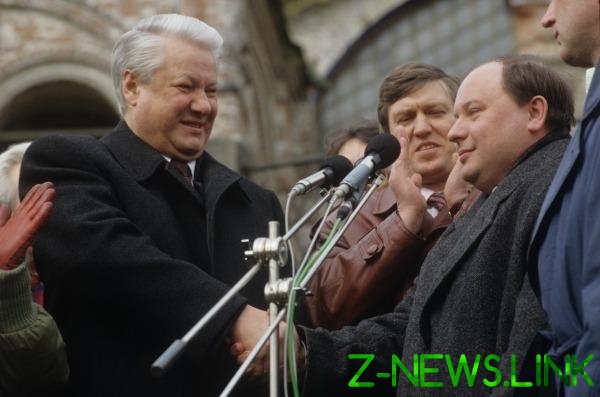 Boris Yeltsin and Yegor Gaidar. 1993 godagari Mikhalev / RIA Novosti
Boris Yeltsin and Yegor Gaidar. 1993 godagari Mikhalev / RIA Novosti
“Moreover, he persuaded Bob, continues Koch. — Went to see him at the Bottom. And Bob told me that he agreed. If this came to Yeltsin and says, “Boris, you have a rating of 3%”. But Yeltsin, he answered: “you said the enemies of Russia. I have a rating of 50%“. They ended the conversation. Chances to convince Yeltsin that he is not 50% in January 1996 did not have any. Bob says, “I danced around him and explained all to no avail.” Ratings-the real Yeltsin did not show. These guys, Korzhakov with [first Deputy Prime Minister Oleg] Soskovets with, they are also “treated” B. N. for the full program. He palmed off fake ratings FAPSI, and was preparing for the April to dissolve the Duma and to declare a state of emergency”.
“Doge” Gaidar, Anatoly Chubais, who headed the election headquarters of presidential candidate Yeltsin: “My position: Yeltsin — the only real opportunity to save the country from a Communist revanche. The position of the “democratic choice” — Yeltsin can not be maintained, he started the war in Chechnya… the Essence of the position of Yegor: it is not about personalities, but about the fate of the country, but you understand me, I can’t go to Congress and say, you know, I changed my mind and need to support Yeltsin. Then we agree with him — you collect the Congress, create the conditions, and I go there and try to reverse the situation. I did… I had a complex process of discussions with Greg, and after that another Congress of the DDA. And eventually open a direct debate, the Congress decided to support Boris Yeltsin, Gaidar… sincerely wanted to stop the Communists and did all that was necessary”. “Egor was convinced that Yeltsin remove has no chance, he would still go and thus split all of these Democrats, then he decided to support it,” — in turn, believes Alfred Koch.
“The position of unconditional support for Yeltsin, without any right to be opposing him was a mistake. Such “close” relations with Yeltsin, when we were not free in their actions, and he is pretty free to do what he pleases, I believe a fundamental mistake. Moreover, there is a view that the conformity of the liberals, the constant desire of their leaders to be with the government in power was the main reason for the discrediting of liberal ideology in Russia. All forgiven: the war in Chechnya, the refusal of real economic reform, corruption,” — says Peter Aven.
Perhaps that is why after 1996, the “Roman” Yeltsin and very sensitive in regards to matters of honor and dignity Gaidar ceased forever. “In General, Yegor understood its drawbacks as public policy. He was not very fond of it all. Well he did not like to engage in public policy… I think he and the cultural-psychological type was more loner than leader,” — says Vladimir Music. After the defeat of the “democratic choice” in the parliamentary elections of 1995 and another his creation — the Union of right forces — in 2004, Yegor left the state Duma and, it seems, has finally returned to his beloved work — a scientist, an expert adviser, publicist, responsible and influential.
The identity of the Gaidar: “Man is big, fearless”
In conclusion, we present a few memorable sayings of the companions and friends of Yegor Gaidar about his personality.
Pyotr Aven: “Gaydar is not just a Russian officer. He grew up in a military family. It was probably the most “correct” person I know. Extremely fundamental. With extremely rigid notions of honor and dignity. For example, Gaidar could not even rude. It absolutely was not a CAD… Very brave. It was easy to imagine the commander of a sinking ship. It would certainly not scared, not panicked, would have behaved very worthy And a very solid moral principles. To discuss with him the topic of bribes, corruption — this theme was totally unacceptable. He was out of discussions on this topic. There is the story of Nemtsov (in the period Boris Nemtsov headed the Nizhny Novgorod region is approx. ed.) as he eggs he brought, but Egor put him out. He was a man of honor, and this is a rare quality… No one in the team, no one person, in this sense, in the sense of principle and of such high moral character, some were not”.
Andrey Nechaev: “Egor sat in the office. Comes the commander of the South [military] district, said: “Guys, Ukrainians are separated. Crimea — our native Russian land. Here’s what I came up with: at Perekop nuclear mines put let turn up“. Egor says: “I personally, you, General, would be shot. Personally. Even three to call will not. If you’ll do it.“ I’m serious: we with Egor have prevented a nuclear war in Central Europe. And these “brave” guys at the time were many. Strategic nuclear button was (sort of) in the presidential briefcase, and tactical nuclear weapons were spread out. And when they say that there is no threat of civil war and so on was not, I remember this uncle, and very smiling attitude to the fact that everything was wonderful and all lived in a terrible friendship. And Egor, of course, was not afraid to make hard decisions. Only, of course, he was such an over Bolshevism that he combines with Chubais”.
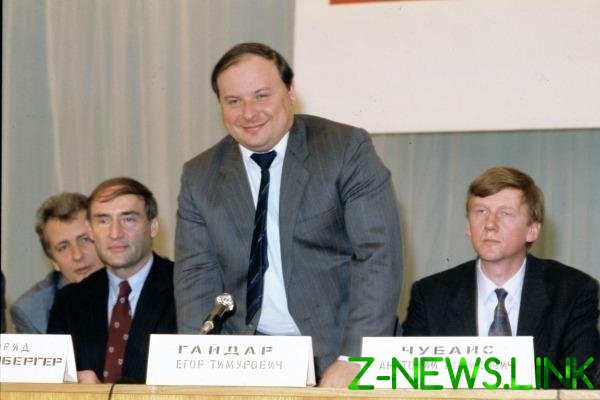 Yegor Gaidar and Anatoly Cubicfeet / RIA Novosti
Yegor Gaidar and Anatoly Cubicfeet / RIA Novosti
Anatoly Chubais: “During the Ossetian-Ingush conflict, when Yegor came to one of the parties to the talks, they shared the porch with corpses uncovered why some spines, don’t know why. Apparently, he wanted to scare. Yegor left the negotiations and went, went, went… I remember it all night from 3 to 4 October 1993, when life really was hanging by a thread… Absolute intellectual concentration, intensive work of mind. Very stiff and technological actions. And your own, and give others on the team… And all that any millimeter of fear… It is the exit to the city Council — one of the major events of that night, prevented a real lot of blood in Russia. And he got there first! … Despite the seeming softness, it was quite a hard man. But without that stiffness to take control of Russia is unacceptable”.
Vladimir Music: “It was a big man, what can I say. People large, fearless, far-seen forward many of the processes that other people didn’t even, didn’t understand. But he understood and, despite everything, took the shot. Life. Unfortunately, the share of Yegor there is a lot of injustice. On it hung a lot of what he did. And generally he tried to write off the problem, which he is not depended on which he could not influence in any way he could. We all know that while we were doing the economic reform, all other reforms do not. It was necessary to do in parallel, judicial reform, military, administrative, constitutional. In parallel, it was necessary to do many reforms, because it fell the whole system of the state.”
According to the testimony of people who knew of Yegor Gaidar, he bravely endured all the hatred of the liberal reformers, focused on his person. According to the remark of Alfred Koch, was “very impressed with the stoicism and courage with which he bore the cross”. Today, few people publicly recalled Yegor Gaidar, “Stolypin 90”, one of the founders of post-Soviet Russia. His views and statements nonconformal and uncomfortable. The demand for them in the future.
Quotes from book: Peter Aven, Alfred Koch “Revolution Gaidar. The history of the reforms of the 90s first hand”, publishing house “Alpina pablisher”, Moscow, 2013
© 2019, paradox. All rights reserved.





